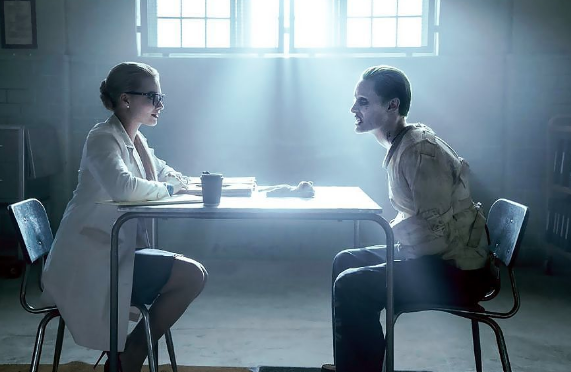Sometimes, when a movie is built up to be total shit for so long and with such adamancy, one can’t help but be pleasantly surprised by the final product (Gigli, of course, is not an example of this). In the case of Suicide Squad, directed and written by David Ayer–whose best film remains Training Day–its berating has been somewhat over the top.
From titles like “Suicide Squad Is A Huge Swirling Vortex of Trash” to “Suicide Squad Is A Superhero Movie for Trump’s America,” the vicious reaming of Ayer’s interpretation of how to corral multiple villains from the DC Comics arsenal has been so unforgiving that it leads one to wonder: has America lost its ability to see an action blockbuster for what it is–all frills and explosions? Those still expecting the high quality of Batman Begins and The Dark Knight with regard to comic book-based movies should push these notions aside based on Warner Bros.’ upcoming churn-out schedule of superhero films through 2020.
Still, there are moments of faint pathos that lure viewers of a susceptible nature into feeling empathy for the likes of Deadshot (Will Smith), Harley Quinn (Margot Robbie), Captain Boomerang (Jai Courtney), El Diablo (Jay Hernandez, who will always hold a special place in one’s heart for his role in Crazy/Beautiful), Killer Croc (Adewale Akinnuoye-Agbaje) and even the evilest of them all, Enchantress (Cara Delevingne).
To lend compassion to Deadshot, the plot point of his daughter, Zoe (Shailyn Pierre-Dixon), confessing to him that she knows he kills people and loves him anyway is heightened when Batman attacks in an alley to apprehend him for the government, and Zoe pleads with Deadshot not to kill yet another. Torn between his lust for the hit and the morality he has deep within him, Deadshot surrenders, led to the “hole” that Amanda Waller (Viola Davis) is about to unearth the squad from.
Where Harley is concerned, her backstory as Dr. Harleen Quinzel explains how she ended up falling in love with The Joker (Jared Leto) after “treating” him in a high-security psych ward. It is, indeed, these flashes to the past of them in all their depraved mutual obsession that prove among the most engaging and layered, serving as the destructive Sid and Nancy love story of the narrative–which is, naturally, always the provider of the greatest source of intrigue and high stakes.
As for the more “auxiliary” players in the squad, Killer Croc provides random and often unintentional comedic relief with his scant few lines, including, “I like her” (the delivery giving Steve Buscemi in The Wedding Singer a run for his money). Captain Boomerang is arguably the least interesting, offering garden variety Australian roguishness. And finally, there is El Diablo, whose gradual emotional dismantling proves to lend an unexpected insight into his greatest source of humanity: compunction for his often uncontrollable “flare-ups.”
Where staunch critics of the film are, admittedly, accurate is in taking issue with the generally frothy superfluity of it all. Motivations for most of each person’s actions are explained away as easily as the summation of Rick Flag (Joel Kinnaman), the leader of the covert task forced helmed by Waller, asking, “What the hell is wrong with you people?” Harley Quinn giggles and says simply, “We’re bad guys, it’s what we do.” Thus, we are supposed to suspend all disbelief for the majority of Suicide Squad, ignoring the incongruities of bad dialogue, bad reasoning for an event to occur and mostly bad music (e.g. Eminem’s “The Real Slim Shady”–and even the throw-in of some classic rock, including The Rolling Stones’ “Sympathy For the Devil,” [also used in that other Margot Robbie/Will Smith movie, Focus] can’t completely salvage the soundtrack).
Even so, one of the most laudable aspects of the film are in its portrayals of Harley Quinn, ultimately responsible for saving the day in a turn of events that proves that not just men are capable of rescuing, and Amanda Waller, a strong black woman in a position of extreme power who might be described as an evil twin version of Michelle Obama. Quinn is, undoubtedly, one of the most fascinating elements of Suicide Squad, her suppressed sense of caring and camaraderie most apparent when she reacts to seeing The Joker presumably perish in a helicopter crash after coming to collect her from the clutches of Waller. Plus, she’s the most pleasant visual out of everyone else in the film, which is never without its virtue (one imagines many a Halloween costume to be modeled after her iconic look).
And while it’s easy to brand the film as idiotic, it can’t be denied that each character was carefully considered by its actors–most especially Jared Leto, who went one step beyond the Heath Ledger method by never breaking character on set, as well as immersing himself in the aesthetic influences of Alejandro Jodorowsky for inspiration. Yes, there is no question that Suicide Squad is pure frippery, but it’s frippery with occasional merit–and not as condemnable as you may have been led to believe.





















